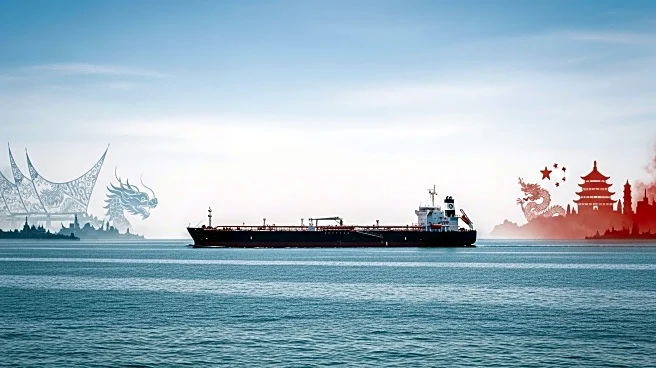What is the story about?
What's Happening?
Recent reports have highlighted a significant increase in Indonesian oil exports to China, amidst allegations of sanctions-avoidance involving Iranian oil. According to Bloomberg, shipments of crude from Indonesia to China surged to 630,000 barrels per day in August, up from an average of 580,000 barrels per day in 2024. This increase comes despite most of Indonesia's oil production being consumed domestically. The rise in exports is linked to ship-to-ship transfers in international waters, with suspicions that Iranian oil is being mislabeled as Indonesian. The Indonesian state-owned oil company, Pertamina, has been implicated in past corruption issues, but current fraudulent activities are reportedly occurring without its knowledge. The situation is further complicated by the logistical challenges of large tankers docking at Indonesian ports, suggesting that some shipping documents may be falsified.
Why It's Important?
The increase in Indonesian oil exports to China amid allegations of sanctions-avoidance has significant implications for international trade and geopolitical relations. If Iranian oil is indeed being mislabeled as Indonesian, it could undermine global sanctions against Iran, affecting the balance of oil supply and demand. This situation also highlights the challenges in enforcing international sanctions and the adaptability of those seeking to circumvent them. For Indonesia, the allegations could impact its international reputation and trade relations, particularly if further investigations reveal complicity in the fraudulent activities. For China, the continued import of discounted Iranian oil, despite official denials, could strain its diplomatic relations with countries enforcing sanctions against Iran.
What's Next?
The ongoing situation is likely to prompt further investigations into the alleged fraudulent activities. Authorities may examine shipping documents and close loopholes to prevent further sanctions-avoidance. However, those involved in the illicit trade are expected to adapt quickly, potentially finding new methods or locations to continue their activities. Meanwhile, Chinese ports identified as receiving 'dark fleet' oil have begun banning future deliveries, although these may simply be redirected to other ports. The international community may increase pressure on both Indonesia and China to ensure compliance with sanctions, potentially leading to diplomatic negotiations or economic repercussions.
Beyond the Headlines
The situation underscores the broader issue of global sanctions enforcement and the challenges faced by governments in curbing illicit trade. It raises ethical questions about the responsibility of state-owned enterprises and the role of international oversight in preventing corruption. The adaptability of sanctions-breakers also highlights the need for more robust and dynamic enforcement mechanisms. Long-term, this could lead to increased scrutiny of oil trade routes and the development of new technologies or strategies to detect and prevent fraudulent activities.















